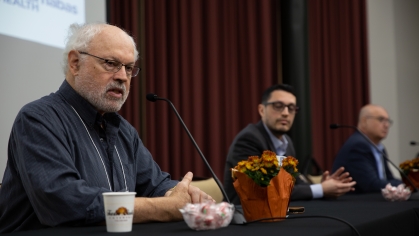Rutgers Experts Oversee Journal Supplement Focused on Research About Premium Cigars
Researchers say premium cigar use is on the rise and more research is needed to understand patterns of use and possible health effects
Experts at the Institute for Nicotine and Tobacco Studies at Rutgers served as guest editors of “Regulatory Research Advances on Premium Cigars,” a special supplement of Nicotine & Tobacco Research sponsored by the Center for Coordination of Analytics, Science, Enhancement, and Logistics in Tobacco Regulatory Science with funding from the National Institute on Drug Abuse at the National Institutes of Health and the Food and Drug Administration’s Center for Tobacco Products.
Rutgers faculty Cristine Delnevo, Andrea Villanti, Ollie Ganz and Kevin Schroth collaborated on the accompanying editorial and contributed to other studies published in the supplement.
Other faculty members from the institute who contributed to studies published in the supplement include Julia-Chen Sankey, Jessica King Jensen, Michelle Bover Manderski and Kymberle Sterling.
Delnevo, director of the institute, and Villanti, deputy director, discussed the importance of the supplement and their research.
Why a special issue?
Delnevo: Prior to this special supplement and a recent report from the National Academies of Sciences, Engineering, and Medicine, only a handful of published studies over the past 50 years directly addressed premium cigars. And premium cigars are making a comeback, with consumption more than doubling in the past decade, reaching an all-time high in 2022.
While this work adds to the limited evidence base, more research is needed to support FDA’s regulatory actions on all cigar products, including the proposed product standard that would ban flavors in cigars. Importantly, the lack of evidence on premium cigars played a major role in the court decision that struck down FDA warning requirements for all cigars, hindering progress on regulating cheap, mass-market cigars (e.g., cigarillos) used disproportionately by vulnerable populations.
Who uses premium cigars?
Delnevo: About 1 percent of the United States adult population smokes premium cigars. Two studies published in the supplement confirm premium cigar use is more prevalent among adults who identify as male, White and have a higher socioeconomic status. However, also note key flaws in measures of premium cigar use, estimating a fivefold difference in the prevalence of premium cigar use based on different definitions of use. Existing national surveys are likely underestimating the prevalence and patterns of premium cigar use.
Purchasing behavior also differed among people using premium cigars compared with other cigar types, with more than 80 percent of premium cigars purchased as single cigars at a price of nearly $9 per stick. Patterns of premium cigar use also differ from those found in other types of cigar users – among current established cigar users, premium cigar users only smoked them occasionally and premium cigar use was not associated with dual use of cigarettes.
How are premium cigars marketed?
Villanti: Compared with other types of cigars, Jensen and colleagues found that premium cigars were overwhelmingly sold as single cigars in brick-and-mortar stores but often purchased in larger quantities when bought online.
In addition to the emergence of marketing via social media and cigar festivals, cigar marketing in lifestyle magazines persists. Sterling and colleagues found that cigar lifestyle magazines continue to promote and normalize premium cigar use as a high-quality product that can have positive health effects.
Are premium cigars as harmful as cigarettes?
Villanti: Given its toxic and carcinogenic constituents, premium cigars are capable of causing adverse health effects, such as heart disease and cancer. However, the health effects depend on frequency and length of use as well as how deeply the products are inhaled. Most people who smoke premium cigars are occasional users and inhale less intensely.
As noted by Manderski and colleagues, studying the health effects of premium cigar use, relative to cigarettes or other types of cigars, is challenging because few major health surveys assess premium cigars and even when premium cigar use can be identified, measures of cancer or heart disease are problematic.



